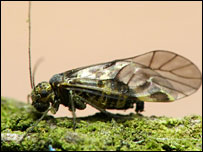New Insect Species Arrives In Uk
New insect species arrives in UK
From: http://news.bbc.co.uk/2/hi/science/nature/7085704.stm
Nov 8, 2007
Almost every tree in Britain is likely to be home to a Barkfly, and now a new family member has come to stay - all the way from the Atlantic Islands.
The Barkfly, Atlantopsocus adustus, which has no English name, has been found colonising stretches of Cornish coast.
The tiny fly may have reached Britain on southerly winds from the Atlantic.
Or, more probably, by hitching a ride on imported plants from Madeira or the Canary Islands.
The Barkfly has been found at five National Trust sites along the Cornish coast. Experts believe that this wave of colonisation is strongly linked to the changing nature of Britain's climate, as the milder and humid weather means that the Barkfly is more likely to survive.
Janet Lister, the National Trust's Nature Conservation Advisor, said: "These new discoveries demonstrate that non-native species, which are used to living in warmer climes, are now able to survive here as a result of global warming."
The discovery was made by ecologist Keith Alexander at Lansallos on the south Cornish coast, as part of the National Barkfly Recording Scheme. The barkflies, collected from a Cornish elm and alder, were first thought to be the known UK Amphigerontia species. Only after careful checking of the wings for spots and vein pattern, was the real identification established.
This new species is unlikely to threaten the other 99 Barkfly species that have been recorded in Britain. Janet Lister said: "Even if the Barkfly, Atlantopsocus adustus, does become widespread, it is unlikely to have a detrimental impact on our native species because other UK Barkfly species are already using the same habitats."
Barkflys are around 5mm long. They live on the bark of trees and shrubs eating lichens and algae.



